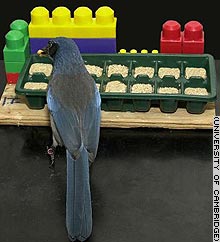Vogel en planning
| 26 sep.2007 |
Een van de menselijke eigenschappen die geacht werd uniek te zijn voor de
soort is het besef van de toekomst. Waar je, gezien het gedrag van de mens
aangaande milieu en klimaat daar zelfs twijfels bij kan zetten, blijkt dat de
basale vormen ervan: het zorgen voor toekomstig voedsel oftewel levensonderhoud,
in ieder geval niet uniek te zijn, in dat vogels er niet, zoals mensen, het er
voortdurend over hebben, maar er daadwerkelijk aan doen.:
Van www.cnn.com, 21-02-2007 (bron hier
 )
)
Birds plan ahead, study shows
Western scrub jays are able to plan for future food shortages by caching food |
Study shows birds can plan ahead in much the same way as people do | Biologists
consider jays to be the most intelligent birds
 Clever
scrub jays can plan on saving tasty treats for the future and do it in a way
that shows they are truly planning ahead, British researchers reported Wednesday. Clever
scrub jays can plan on saving tasty treats for the future and do it in a way
that shows they are truly planning ahead, British researchers reported Wednesday.
They set up a careful experiment to allow the birds to cache
food in a certain way if they were indeed planning, and found the birds were up
to the task.
Their study, published in the journal Nature, adds to several
others that show animals such as great apes and certain birds can plan ahead in
much the same way as people do.
"Knowledge of and planning for the future is a complex skill
that is considered by many to be uniquely human," Nicola Clayton and colleagues
at the University of Cambridge wrote.
"We show that the jays make provision for a future need, both
by preferentially caching food in a place in which they have learned that they
will be hungry the following morning and by differentially storing a particular
food in a place in which that type of food will not be available the next
morning," they added.
In the complicated experiment, the jays were kept in large
cages with two rooms. They were moved from one compartment to another depending
on the time of day.
They also got different types of food -- ground-up pine nuts,
which they could not store, and peanuts and dog kibble, which they could. Scrub
jays love all three.
First they fed the birds on a schedule, with breakfast being
served in one compartment but not the other. Then they threw the birds off this
schedule by unexpectedly feeding them in the evening.
The birds stored more food if they got this surprise evening
meal in the compartment where they usually were not fed than if they got the
night treat in the "breakfast room," Clayton's team reported.
Planning ahead
In a second experiment, the birds got breakfast in both rooms but peanuts only
in one and dog kibble only in the other. Then they got a chance to hide both
types of food anywhere they liked.
They hid dog food in the peanut compartment and vice-versa,
the researchers saw.
"The results described here suggest that the jays can
spontaneously plan for tomorrow without reference to their current motivational
state, thereby challenging the idea that this is a uniquely human ability,"
Clayton's team argued.
Sara Shettleworth of the University of Toronto in Canada
agreed.
"Two requirements for genuine future planning are that the
behavior involved should be a novel action, or combination of actions (thus
ruling out migrating and hibernating), and that it should be appropriate to a
motivational state other than the one the animal is in at that moment," she
wrote.
So the animals must not be acting out of immediate hunger,
for instance.
She said Clayton's experiment was the first to unambiguously
fulfill both requirements.
Last May, a team led by Joanna Dally of the University of
Cambridge reported that scrub jays could remember which other birds were
watching them when they first hid some treats, and change the hiding places if
there was a chance the other birds could steal the food.
Jays are members of a group of birds called corvids, which
include crows, jays and ravens. Biologists consider them to be the most
intelligent birds.
Also last May, Nicholas Mulcahy and Josep Call of the
Max Planck Institute for Evolutionary Anthropology in Leipzig, Germany, tested
bonobos, close relatives of chimpanzees, and orangutans at the local zoo and
found the animals could plan and use tools.
Naar Evolutie, lijst
 ,
Wetenschap,
overzicht ,
Wetenschap,
overzicht  , of site home , of site home
 . .
|